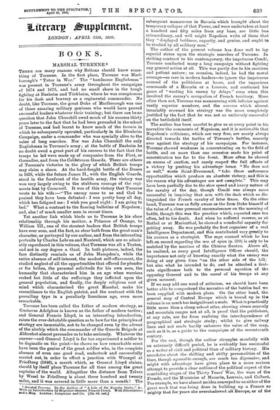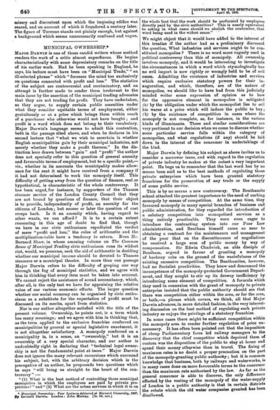BOOKS.
MARSHAL 1. U _RENEE.* THERE are many reasons why Britons should know some- thing of Turenne. In the first place, Turenne was Marl- borough's "Tutor in War." The "handsome Englishman" was present in Turenne's army throughout the campaigns of 1674 and 1675, and had no small share in the tough fighting at Ensheim and Turk beim, where he was conspicuous for his dash and bravely as a regimental commander. No doubt, like Turenne, the great Duke of Marlborough was one of those amazing military geniuses who would have proved successful leaders whatever their training; but there can be no question that John Churchill owed much of his success thirty years later to the fact that he had been grounded in the school of Turenne, and had learnt to know much of the terrain in which he subsequently operated, particularly in the Blenheim Campaign, under a commander who was specially alive to the value of long, marches. Nor was John Churchill the only Englishman in Turenne's army ; at the battle of Ensheim he no doubt owed a great part of his success to the fact that the troops be led were made up of companies from the First, or Grenadier, and from the Coldstream Guards. There are others of Turenne's victories in the glory of which British troops may claim a share. At the hard-fought battle of the Dunes in 1658, while the future James II., with the English Guards, stood in the forefront of the hostile army, the victory was won very largely owing to the stubborn courage of the regi- ments lent by, Cromwell. It was of this victory that Turenne wrote to his wife :—" The enemy came to us and God be praised they have been defeated : I was pretty busy all day, which has fatigued me : I wish you good night : I am going to bed.' What a contrast to the flaming bulletins of Napoleon ; and, alas! of much smaller men in recent times.
Yet another link which binds us to Turenne is his close relationship through his mother, a Princess of Orange, to William III., one of the stoutest leaders that British troops have ever seen, and the fact, so clear both from the great man's character, as portrayed by our author, and from the interesting portraits by Charles Lebrun and Nantenil, which are so admir- ably reproduced in this volume, that Turenne was all a Teuton, and not in any degree a Gaul. In both pictures, indeed, the face distinctly reminds us of John Hampden's, while the entire absence of self-interest, the modest self-effacement, the studied neglect of all the opportunities that offered for plunder or for bribes, the personal solicitude for his own men, the humanity that characterised him in an age when warriors reeked but little of the sufferings they inflicted upon the general population, and finally, the deeply religious cast of mind which characterised the great Marshal, make his resemblance to the English patriot, and the contrast with the prevailing type in a peculiarly licentious age, even more remarkable.
Tureune has been called the father of modern strategy, as G nstavus Adolphus is known as the father of modern tactics ; and General Francis Lloyd, in an interesting introduction, raises the ever-debatable question as to how far the principles of strategy are immutable, not to be changed even by the advent of the airship which the commander of the Guards Brigade at Aldershot almost persuades us to take seriously. Whatever the answer—and General Lloyd is far too experienced a soldier to be dogmatic on the point—he shows us bow remarkable must have been the genius of the great soldier who, in the complete absence of even one good road, undertook and successfully carried out, in order to effect a junction with Wrangel at Friedberg (1646), a march which, as General Lloyd claims, should by itself place Turenne for all time among the great captains of the world. Altogether the distance from Treves by Wesel to Friedberg is about three hundred and twenty miles, and it was covered in liffle more than a month! The
Marshal, Turenne. By the Author of " A Life of Sir Kenelm Dighy," Ar. With an Introduction brlirigudier-Ohneral Era:lab:Lloyd. With Illustrations find a Map. London : Longmana and Co. [12a. 6d. net.]
subsequent mancetivres in Bavaria which brought about the temporary collapse of that Power, and were undertaken at least a hundred and fifty miles from any base, are little less extraordinary, and well might Napoleon write of them that they "displayed boldness, sagacity, and genius, and ought to be studied by all military men."
The author of the present volume has done well to lay especial stress upon the strategic marches' of Turenne. In striking contrast to his contemporary; the impetuous Conde, Turenne conducted many a long campaign without fighting any general action at all. This was partly due to his cautions
and patient nature ; on occasion, indeed, he had the moral
courage—so rare in modern leaders—to ignore the impetuous counsel of the politicians at home, and the imperious commands of a Mazarin or a Louvois, and continued his game of "wasting his enemy by delays" even when this involved the enemy's occupation of French territory. More often than not, Turenne was manceuvring with inferior against vastly superior numbers, and the success which almost invariably crowned his strategy was the more completely justified by the fact that be was not so uniformly successful on the battlefield itself.
The author has been careful to give us at every point in his narrative the comments of Napoleon; and it is noticeable that Napoleon's criticisms, which are very free, are nearly always directed towards the tactics of Turenne's baffles, scarcely ever against the strategy of his campaigns. For instance, Turenne showed' weakness in concentrating on to the field of battle, and on more than one occasion made his point of • concentration too far to the front. More often he showed an excess of caution; and rarely reaped the full effects of a victory by pushing- his advantage. home. "Re' dbee not so well," wrote Saint.Evremond, "' take those unforeseen opportunities which produce an absolute victory, and this is the reason why his advantages are nob complete." This may have been partially due to the slow speed and heavy nature of the cavalry of the day, though Ocinde was always more
• successful in inspiring, that arm with the dash which so dis- tinguished the French cavalry of later times. On the other hand, Turenne was as fully aware aw the Iran, Duke himself of
the value of a close personal reconnaissanceon the' morning of battle, though this was the practice' which; repeated once too often, led to his death: And when he suffered reverse, as at Bethel or at Marientbal, he showed a wonderful capacity for getting away. He was probably the first organiser of a real Intelligence Department, and this contributed very greatly to his success as a strategist. The sage counsel which he has left on record regarding the use of spies (p. 310) is only to be
matched by the maxims of the Chinese Suutzu. Above all, he realised, as every good Intelligence Officer should, the importance not only of knowing exactly what the enemy was doing at any given time "on the other side of the hill,' but also what he intended to do, and he attached a first- rate significance both to the personal equation of the opposing General and to the moral' of his troops at any given moment. If we may add one word of criticism, we should: have been better able to comprehend the narrative of the battles, had we been supplied with modern plans. On the other hand, the
general map of Central Europe which is bound up in the volume is on much too insignificant a scale. What is practically little more than a cheap school atlas, showing rivers scarcely and mountain ranges not at all, is proof that the publishers, at any rate, are far from realising the interdependence of
geographical and strategic study; whilst to give railway lines and not roads hardly enhances the value of the map, such as it is, as a guide. to the campaigns of the seventeenth century.
For the rest, though the author struggles manfully with an extremely difficult period, be is evidently less successful as a writer of civil and political than of military history. His anecdotes about the shifting and shifty personalities of the time, though agreeable enough, are much too digressive, and might with advantage have given place to a more serious attempt to provide a clear outline of the political aspect of the concluding stages of the Thirty Years' War, the wars of the Fronde, and the Ministries of Mazarin; Louvois, and Colbert. For example, we have almost no idea conveyedto us either of the great-work that was being done in building up a France so mighty that for years she overshadowed all. Europe, or of the misery and discontent upon which the imposing edifice was reared, and on account of which it foqndered a century later. The figure of Turenne stands out plainly enough, but against a background which seems unnecessarily confused and vague.























































 Previous page
Previous page